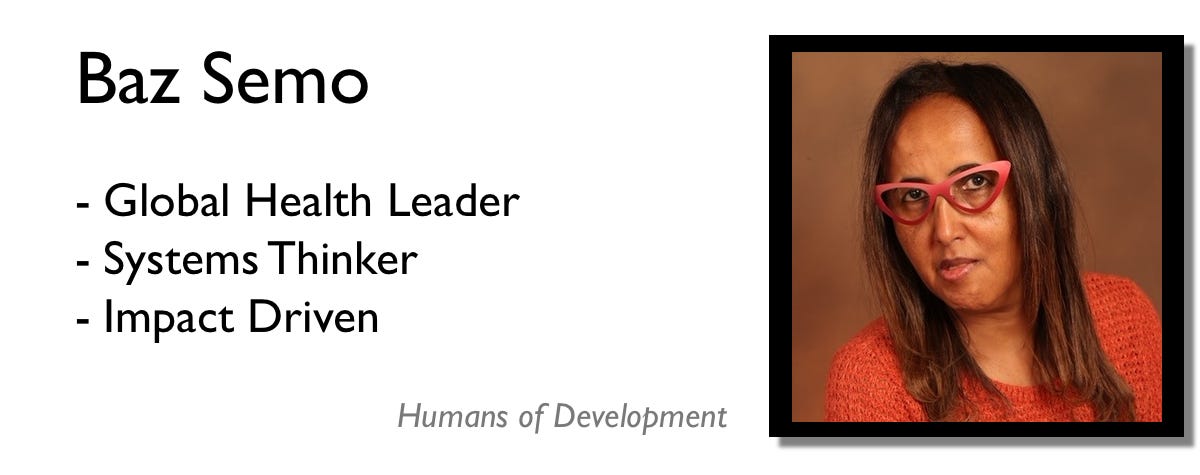Introducing Humans of Development: Baz Semo
The real people and measurable impact made through global health programming
What’s one common misconception about your work?
I am Baz Semo. I practiced as a physician for nearly two decades before transitioning to a career in global health. I made the pivot because I was seeking new challenges, ones that would push me to think creatively and solve complex, systems-related problems.
Interestingly, many of my friends and family, most of whom are also in the medical field, assumed I chose global health because it would be less demanding than clinical medicine.
In reality, the opposite has been true.
The work was equally, if not more demanding, as it requires navigating intricate systems, driving impact at scale, and constantly adapting to unpredictable and rapidly evolving challenges, all of which call for intense levels of creativity, resilience, and leadership.
What is one story that reminds you why you do this work?
One example that stands out is from my time in Botswana, where my team and I partnered closely with the government to strengthen and sustain the national health workforce leading the HIV and TB response. Together, we implemented several impactful initiatives:
We established a four-year laboratory scientist training program at the University of Botswana, graduating three cohorts before fully transitioning the program to the university.
We developed a cadre of monitoring and evaluation (M&E) officers through a tailored, on-the-job training program, and worked with the government to integrate these officers into the public health system.
We designed and implemented a secondment program within the Ministry of Health to facilitate skills transfer from senior seconded staff to junior government personnel, ensuring long-term capacity.
These efforts led to significant improvements in clinical staffing, program management, and data reporting quality, laying the foundation for a more resilient and effective national health system.
How do you ensure that evidence is used to improve lives?
A particularly meaningful example comes from my time at Chemonics International. My team and I conducted a qualitative study in Northern Nigeria to better understand the experiences of people living with HIV and health care providers with differentiated service delivery models for antiretroviral treatment refills.
From the outset, we worked closely with policymakers, healthcare providers, and community members in the target states to design research questions that reflected their needs and realities.
After completing the study, we reconvened with policymakers and providers to present the findings, discuss their implications, and collaboratively develop action plans to address the program gaps identified.
Importantly, our colleagues at the Ministry of Health took full ownership of the action plan, leading its implementation and ensuring that the research translated into meaningful program improvements.
What was a central leadership experience?
A couple of years ago, I transitioned to the headquarters of FHI 360 after spending 25 years working in the field.
I inherited the privilege of leading a remarkable global team of about 140 highly accomplished health professionals, each deeply committed to advancing impact in their technical areas.
While they were passionate and mission-driven, they were also looking for a leader they could trust, someone who would provide the support, guidance, and advocacy they needed to succeed.
Coming in as an unfamiliar face to most of them, I vividly recall how challenging it was to gain their trust at the outset. I quickly learned that being an effective leader in this context required more than setting strategy or driving results; it required deep, intentional listening, humility in navigating complex organizational dynamics, and a genuine commitment to mentoring and empowering these talented colleagues to take on new professional challenges.
One of the most enduring leadership lessons I took from this experience is the power of collaboration and shared accountability. I discovered that the most meaningful progress happens when teams feel a sense of collective ownership, when they know their voices matter and their contributions shape the path forward.
This experience continues to inform how I lead today: with an emphasis on partnership, transparency, and fostering environments where people are not only supported but also inspired to stretch into their fullest potential.
What excites you most about the future of global health?
Today’s technological advancements are poised to transform global health in numerous ways.
For example, digital health tools, such as telemedicine are expanding access to care in remote and underserved areas, as demonstrated by the work we do at The Addis Clinic.
Meanwhile, artificial intelligence is revolutionizing data-driven decision-making, enabling faster, more accurate responses to complex health challenges than ever before.
We must embrace today’s technology to achieve greater equity, resilience and sustainability in global health.
Please contact Sulakshana Gupta if you’re a paid Career Pivot subscriber who would like to be profiled in a future Humans of Development post on Career Pivot and LinkedIn.






